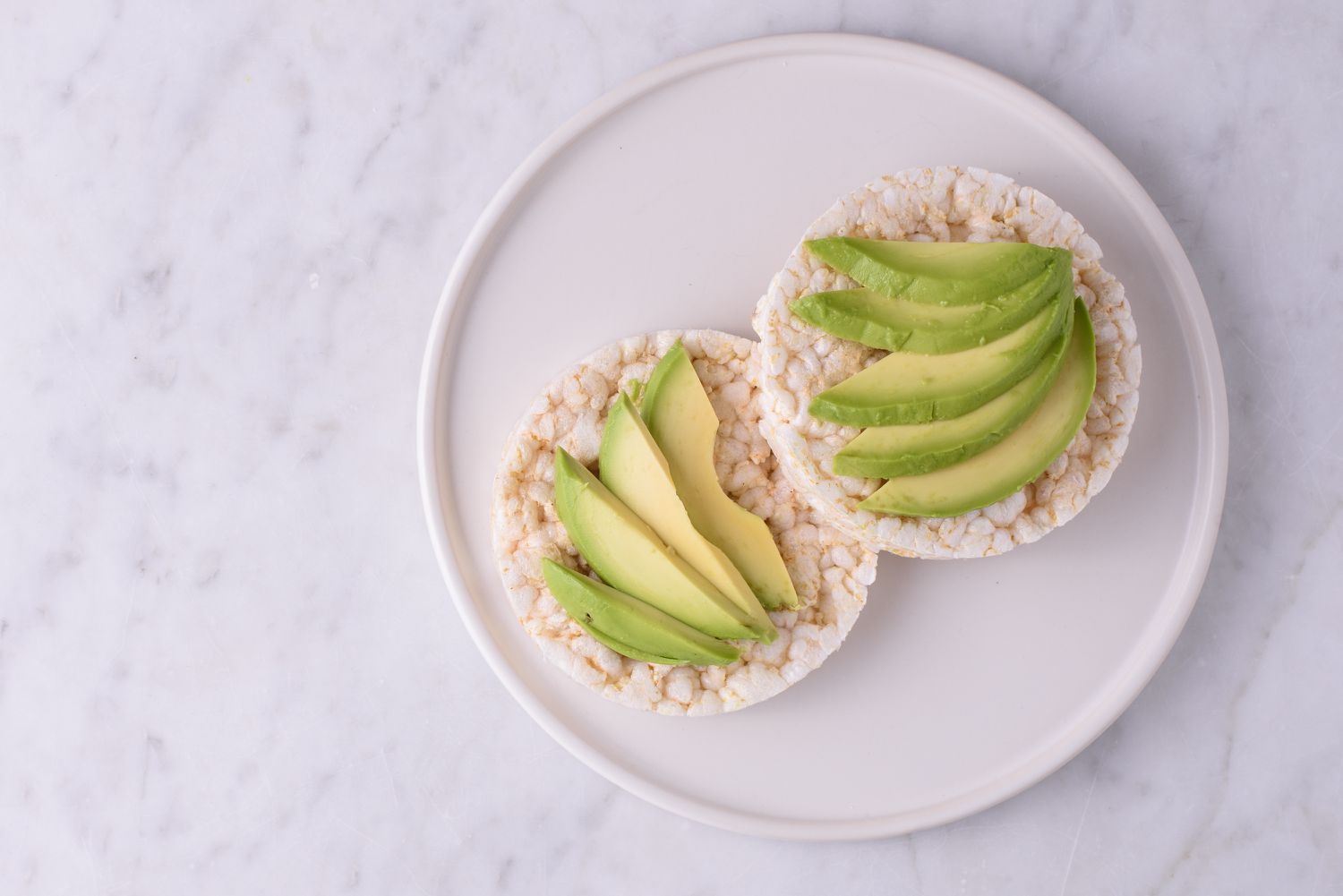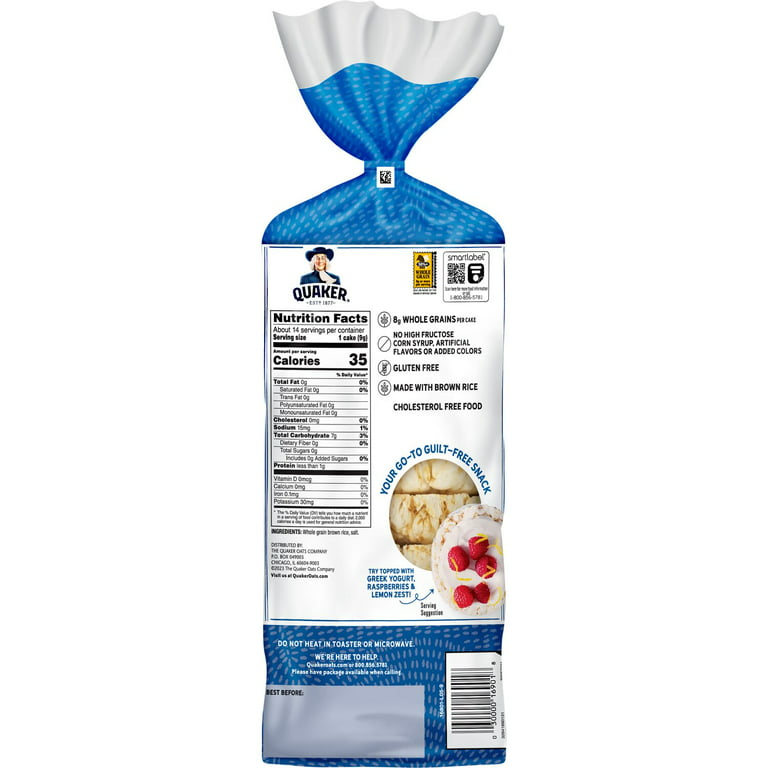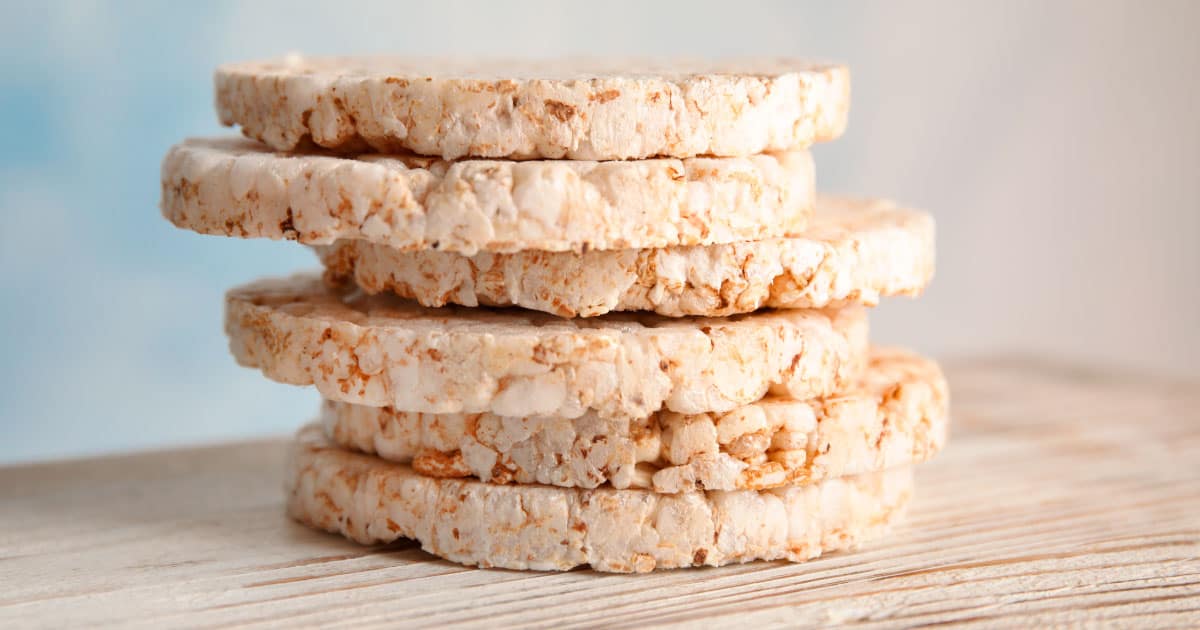
Introduction
What Are Rice Cakes?
Rice cakes are a type of snack food that is made from rice grains. They are typically round, flat disks that are light and crispy in texture. Rice cakes are often considered a healthier alternative to other snack options due to their low calorie content.
Popular Uses Of Rice Cakes As A Snack
Rice cakes are commonly used as a snack due to their convenience and versatility. They can be enjoyed on their own or paired with various toppings or spreads. Some popular ways to enjoy rice cakes include:
- Plain: Rice cakes can be eaten plain, making them a simple and light snack option.
- Topped with nut butter: Adding a spread of nut butter, such as peanut butter or almond butter, can provide a source of healthy fats and protein.
- Topped with avocado: Slicing an avocado and placing it on top of a rice cake can create a satisfying and nutritious snack.
- Topped with cheese or hummus: Adding a slice of cheese or a spread of hummus can provide additional flavor and protein to a rice cake.
- Used as a base for mini sandwiches: Rice cakes can serve as a healthier alternative to bread when making mini sandwiches or snacks.
While rice cakes are a popular snack option, it is important to note that they do not provide a significant amount of nutrients. They are low in calories, fat, protein, and fiber. Therefore, they may not be as filling or satisfying as other snack options that offer more nutritional value.
In conclusion, rice cakes can be enjoyed as a light and convenient snack, but they should not be relied upon as a significant source of nutrients. It is important to incorporate a balanced and varied diet that includes a wide range of nutrient-dense foods for optimal health.
Introduction
Rice cakes are a type of snack food made from rice grains. They are round, flat disks that have a light and crispy texture. Rice cakes are often seen as a healthier snack option due to their low calorie content.
Popular uses of rice cakes as a snack
Rice cakes are commonly used as a snack because they are convenient and versatile. They can be eaten on their own or topped with various spreads or toppings. Some popular ways to enjoy rice cakes are:
- Plain: Rice cakes can be eaten plain for a simple and light snack.
- Topped with nut butter: Adding a spread of nut butter, like peanut or almond butter, can provide healthy fats and protein.
- Topped with avocado: Placing sliced avocado on top of a rice cake can create a satisfying and nutritious snack.
- Topped with cheese or hummus: Adding a slice of cheese or a spread of hummus can add flavor and protein to a rice cake.
- Used as a base for mini sandwiches: Rice cakes can be used as a healthier alternative to bread in mini sandwiches.
However, it is important to note that while rice cakes are a popular snack choice, they do not provide a significant amount of nutrients. They are low in calories, fat, protein, and fiber. This means that they may not be as filling or satisfying as snacks that offer more nutritional value.
Nutritional Value of Rice CakesRice cakes lack significant nutritional value due to their low content of essential nutrients. Here are two key areas where rice cakes fall short:
Lack of fiber in rice cakesFiber is an essential nutrient for maintaining a healthy digestive system and promoting feelings of fullness. Unfortunately, rice cakes have a minimal amount of fiber. This can lead to a less satisfying snack and increased hunger soon after eating.
Low protein content in rice cakesProtein is an important macronutrient that helps maintain muscle mass and supports various bodily functions. Rice cakes contain very little protein, making them an inadequate source for meeting daily protein needs.
ConclusionIn conclusion, while rice cakes can be enjoyed as a light and convenient snack, they should not be relied upon as a significant source of nutrients. It is important to incorporate a balanced and varied diet that includes a wide range of nutrient-dense foods for optimal health.
Carbohydrates In Rice Cakes
Amount Of Carbohydrates In Rice Cakes
Rice cakes are an excellent source of complex carbohydrates, which are essential for energy production and metabolism. Each rice cake typically contains around 7-11 grams of carbohydrates, depending on the brand and flavor. The carbohydrates in rice cakes come from the rice grains used in their production.
Role Of Carbohydrates In A Healthy Diet
Carbohydrates are an important macronutrient that provides the body with energy. They are the body’s preferred source of fuel, especially for the brain and muscles. Carbohydrates are broken down into glucose, which is then used by cells for energy. Additionally, carbohydrates play a vital role in regulating blood sugar levels and supporting proper digestion.
Including a moderate amount of carbohydrates in a healthy diet is important for overall health and well-being. However, it is essential to choose carbohydrates that are nutrient-dense and provide other beneficial nutrients, such as fiber, vitamins, and minerals. While rice cakes do provide carbohydrates, they lack significant amounts of other essential nutrients like fiber and protein.
Therefore, while rice cakes can be enjoyed as a light and convenient snack, they should not be relied upon as a significant source of carbohydrates or other essential nutrients. It is important to incorporate a balanced and varied diet that includes a wide range of nutrient-dense foods for optimal health.

Fat Content In Rice Cakes
Low Fat Content In Rice Cakes
Rice cakes have a very low fat content, with most varieties containing around 0 grams of fat per serving. This is because rice cakes are made from cooked rice that is compressed and popped, resulting in a light and crispy texture. As a result, rice cakes are often considered a low-fat snack option.
Benefits Of Low-fat Snacks
Choosing low-fat snacks can be beneficial for those who are watching their fat intake or trying to maintain a healthy weight. Low-fat snacks can help reduce the consumption of saturated and trans fats, which have been linked to an increased risk of heart disease and other health issues.
In addition, low-fat snacks can be a good option for individuals who have digestive issues or conditions that require a low-fat diet, such as gallbladder problems. These snacks can be easier to digest and less likely to cause discomfort or digestive symptoms.
However, it’s important to note that not all low-fat snacks are necessarily healthier options. Some low-fat snacks may contain added sugars or artificial ingredients to enhance taste or texture. It’s always recommended to read the nutrition label and choose snacks that are low in fat but also provide other important nutrients.
In conclusion, rice cakes have a low fat content and can be enjoyed as a low-fat snack. However, it’s important to remember that they should be part of a balanced diet that includes a variety of nutrient-dense foods. Incorporating a range of fruits, vegetables, whole grains, lean proteins, and healthy fats is key to achieving optimal health and well-being.
Sodium Content In Rice Cakes
Sodium Levels In Rice Cakes
Rice cakes are known for their low sodium content, with most varieties containing about 20-30 milligrams of sodium per serving. This makes them a suitable snack option for individuals who need to limit their sodium intake.
Impact Of Sodium On Health
Consuming too much sodium can have negative effects on health, such as increasing the risk of high blood pressure, heart disease, and stroke. Therefore, choosing snacks with lower sodium levels, like rice cakes, can be beneficial for individuals who are trying to manage their sodium intake.
By opting for low-sodium snacks like rice cakes, individuals can reduce their overall sodium consumption and potentially improve their health outcomes. However, it’s important to note that while rice cakes are low in sodium, they may still contribute to overall sodium intake if consumed in large quantities or paired with high-sodium toppings or spreads.
It’s always advisable to read the nutrition label and choose toppings or spreads that are low in sodium to maintain a balanced diet. Additionally, it’s important to incorporate other nutrient-dense foods, such as fruits, vegetables, whole grains, lean proteins, and healthy fats, into the diet to ensure optimal health and well-being.
In conclusion, rice cakes are a low-sodium snack option and can be enjoyed as part of a balanced diet. However, individuals should be mindful of portion sizes and choose toppings or spreads that are low in sodium to further reduce sodium intake. By incorporating a variety of nutrient-dense foods into their diet, individuals can support their overall health and well-being.
Vitamins And Minerals In Rice Cakes
Absence Of Significant Vitamin Content In Rice Cakes
Rice cakes do not contain significant amounts of vitamins. They are primarily made from rice and air, which means that their nutrient profile is not very impressive in terms of vitamins. While they may provide small amounts of certain vitamins, such as vitamin E and some B vitamins, these amounts may not be significant enough to contribute significantly to your daily vitamin needs. It is important to include a variety of other nutrient-rich foods in your diet to meet your vitamin requirements.
Limited Mineral Content In Rice Cakes
Rice cakes do contain some minerals, but the amounts are limited. One mineral that can be found in rice cakes, specifically brown rice cakes, is manganese. Manganese is a mineral that supports your immune system, aids in collagen production, and helps maintain strong bones. However, the amount of manganese in rice cakes may not be significant enough to provide substantial health benefits.
It’s worth noting that while rice cakes may be low in sodium and can be a suitable low-sodium snack option, they should not be relied upon as a primary source of essential vitamins and minerals. To ensure you meet your daily nutrient needs, it’s important to incorporate a variety of nutrient-dense foods, including fruits, vegetables, whole grains, lean proteins, and healthy fats, into your diet.
In summary, while rice cakes may be a low-sodium snack choice, they are not a significant source of vitamins and minerals. To maintain optimal health and well-being, it is important to consume a balanced diet that includes a variety of nutrient-dense foods.

Potential Benefits Of Rice Cakes
Suitable For Gluten-free Diets
Rice cakes are a suitable snack option for individuals following a gluten-free diet. Since they are made from rice and air, they do not contain gluten, which is a protein that some people may be intolerant or sensitive to. Gluten-free diets are necessary for individuals with celiac disease, non-celiac gluten sensitivity, or wheat allergies. Rice cakes can provide a convenient option for those looking for gluten-free snacks.
Low Calorie Option For Weight Management
Rice cakes are also a low-calorie snack choice, which can be beneficial for individuals who are watching their calorie intake for weight management. Rice cakes typically contain around 35-50 calories per serving, making them a light and satisfying option. They can be enjoyed plain or topped with a variety of toppings, such as nut butter or avocado, for added flavor and satiety. Incorporating low-calorie snacks like rice cakes into a balanced diet can help support weight management goals.
It’s important to note that while rice cakes may have certain benefits, they should be enjoyed as part of a well-rounded diet. They should not replace nutrient-rich foods that provide essential vitamins, minerals, and other nutrients. Including a variety of fruits, vegetables, whole grains, lean proteins, and healthy fats in your diet is crucial for meeting your overall nutrient needs.
In conclusion, rice cakes can be a suitable option for individuals following a gluten-free diet and looking for a low-calorie snack option. However, they should be consumed in conjunction with other nutrient-rich foods to ensure a balanced diet.
Potential Concerns About Rice Cakes
High Glycemic Index And Impact On Blood Sugar Levels
One potential concern with rice cakes is their high glycemic index, which refers to how quickly a food raises blood sugar levels. While whole-grain brown rice cakes may be a healthier option than white rice cakes, they can still cause a rapid increase in blood sugar levels if consumed alone. This can be a particular concern for individuals with diabetes or those trying to manage their blood sugar levels. To help mitigate this effect, it is recommended to consume rice cakes with a source of protein or healthy fats to slow down the absorption of glucose into the bloodstream. Combining rice cakes with foods such as nut butter, avocado, or yogurt can help balance blood sugar levels and provide a more balanced snack option.
Lack Of Substantial Nutritional Value
Another concern with rice cakes is their lack of substantial nutritional value. While they may be low in calories, fiber, and protein, rice cakes do not provide a significant amount of essential vitamins, minerals, or other nutrients. They are essentially made of rice and air, resulting in a minimal nutrient profile. Therefore, relying solely on rice cakes as a snack may not provide the necessary nutrients for overall health and well-being. It is important to incorporate a variety of nutrient-rich foods such as fruits, vegetables, whole grains, lean proteins, and healthy fats into the diet to ensure an adequate intake of essential nutrients.
It’s important to consider these concerns about rice cakes when incorporating them into your diet. While they can be a suitable option for individuals following a gluten-free diet or looking for a low-calorie snack, they should not be relied upon as a sole source of nutrition. Incorporating a variety of foods that provide essential nutrients is key to maintaining a balanced diet and supporting overall health.
Potential Concerns About Rice Cakes
High Glycemic Index And Impact On Blood Sugar Levels
One potential concern with rice cakes is their high glycemic index, which refers to how quickly a food raises blood sugar levels. While whole-grain brown rice cakes may be a healthier option than white rice cakes, they can still cause a rapid increase in blood sugar levels if consumed alone. This can be a particular concern for individuals with diabetes or those trying to manage their blood sugar levels. To help mitigate this effect, it is recommended to consume rice cakes with a source of protein or healthy fats to slow down the absorption of glucose into the bloodstream. Combining rice cakes with foods such as nut butter, avocado, or yogurt can help balance blood sugar levels and provide a more balanced snack option.
Lack Of Substantial Nutritional Value
Another concern with rice cakes is their lack of substantial nutritional value. While they may be low in calories, fiber, and protein, rice cakes do not provide a significant amount of essential vitamins, minerals, or other nutrients. They are essentially made of rice and air, resulting in a minimal nutrient profile. Therefore, relying solely on rice cakes as a snack may not provide the necessary nutrients for overall health and well-being. It is important to incorporate a variety of nutrient-rich foods such as fruits, vegetables, whole grains, lean proteins, and healthy fats into the diet to ensure an adequate intake of essential nutrients.
It’s important to consider these concerns about rice cakes when incorporating them into your diet. While they can be a suitable option for individuals following a gluten-free diet or looking for a low-calorie snack, they should not be relied upon as a sole source of nutrition. Incorporating a variety of foods that provide essential nutrients is key to maintaining a balanced diet and supporting overall health.
Conclusion
Final Verdict On The Healthiness Of Rice Cakes
In conclusion, rice cakes may not be the healthiest snack option due to their high glycemic index and lack of substantial nutritional value. While they can be enjoyed in moderation as part of a balanced diet, it is important to consider their impact on blood sugar levels and nutrient intake. Individuals with diabetes or those looking to manage their blood sugar levels should be cautious when consuming rice cakes and opt for pairing them with protein or healthy fats. Additionally, incorporating a variety of nutrient-rich foods is essential for overall health and well-being.
Alternatives To Rice Cakes For A Well-rounded Diet
If you’re looking for alternatives to rice cakes that offer more nutritional value, consider the following options:- Whole grain crackers or crispbreads- Veggie sticks with hummus or Greek yogurt dip- Air-popped popcorn- Nuts and seeds- Fresh fruit or fruit slices with nut butter- Greek yogurt with berries
These alternatives provide a wider range of nutrients, including fiber, protein, vitamins, and minerals. Incorporating these options into your diet can help ensure a well-rounded and nutritious snack selection.
FAQ: Are Rice Cakes Healthy? Exploring the Nutritional Value of Rice Cakes
Q: What are rice cakes?
A: Rice cakes are crispy snacks made from rice grains that have been cooked, flattened, and sometimes puffed. They come in various shapes and sizes, such as round, square, or even in the form of mini rice cakes.
Q: Are rice cakes a healthy snack option?
A: Rice cakes can be a healthy snack option, depending on how they are consumed and the ingredients used. While they are known for being low in calories and fat, it’s essential to consider their overall nutritional value.
Q: Do rice cakes contain many calories?
A: Rice cakes are generally low in calories, making them a popular choice for those watching their calorie intake. On average, a plain rice cake contains around 35-40 calories per serving.
Q: Are rice cakes a good source of carbohydrates?
A: Yes, rice cakes are a good source of carbohydrates. They are made primarily from rice, which is a staple food in many cultures and provides vital energy for the body.
Q: Are rice cakes gluten-free?
A: Rice cakes are gluten-free if they are made solely from rice. However, some flavored or seasoned varieties may contain gluten due to added ingredients. It’s advisable to check the packaging or opt for specifically labeled gluten-free rice cakes.
Q: Are rice cakes a good option for weight loss?
A: Rice cakes can be a suitable option for weight loss due to their low calorie content, as they can help in reducing overall calorie intake and controlling portion sizes. However, it’s essential to consume them as part of a balanced diet and not rely solely on rice cakes for weight loss.
Q: Are rice cakes high in fiber?
A: Plain rice cakes have a low fiber content as most of the bran and germ layers of the rice grain are removed during processing. However, some varieties are available that are enriched with additional fiber.
Q: Are rice cakes nutritious?
A: While rice cakes are not an excellent source of essential nutrients, they can still provide some nutritional value. They primarily contribute carbohydrates and a small amount of minerals like magnesium and phosphorus. However, compared to whole grains like brown rice, rice cakes may lack some nutrients.
Q: Can rice cakes be a good snack for people with dietary restrictions?
A: Rice cakes are a suitable snack option for people with various dietary restrictions. They are often gluten-free, and there are also vegan and organic varieties available. However, if you have specific dietary needs or allergies, it’s always advisable to check the product’s label before consuming.
Q: Are flavored rice cakes healthy?
A: Flavored rice cakes may contain added ingredients such as salt, sugar, or artificial flavorings. While they can still be enjoyed in moderation, it’s advisable to choose healthier flavor options or make your own using natural ingredients to control the amount of added sugar or sodium.
In conclusion, rice cakes can be a healthy snack option, particularly when chosen mindfully and consumed as part of a balanced diet. Opting for plain or whole grain varieties, avoiding excessive flavorings, and combining them with nutrient-dense toppings can help maximize their nutritional value.

Sweet Delights Bakery, Inc. is a beloved establishment that has captured the hearts and taste buds of customers across the nation. Voted America’s #1 Pie by Business Insider and named Florida’s Best Bakery by BuzzFeed, Sweet Delights Bakery, Inc. has established itself as a premier destination for irresistible treats and delectable desserts.Founded with a passion for creating exceptional baked goods, Sweet Delights Bakery, Inc. has been serving up a wide array of mouthwatering pies, pastries, and confections since its inception. With a commitment to using only the finest ingredients and time-honored recipes, the bakery has earned a stellar reputation for delivering unparalleled flavor and quality in every bite.